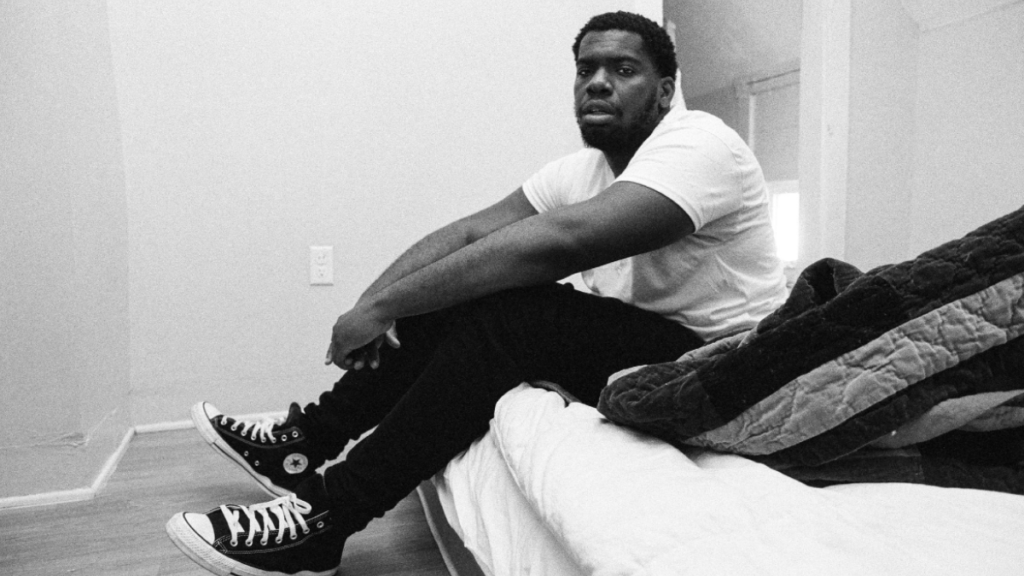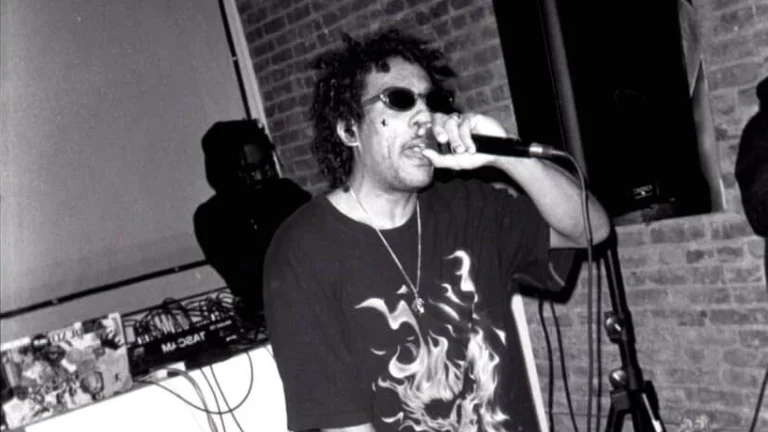Brockton rapper Jiles, of growing rap label and collective Van Buren Records, makes his presence felt wherever he goes. He has proven himself before as a rapper on projects such as It’s Not Much, But It’s Mine, and in his work with Van Buren Records to help build the foundations of a growing local music scene for Brockton. Mookie Blaylock is Jiles’ new Vinyl Villain-produced album. It’s a gritty and grimy listen, with that grit captured largely in Jiles’ signature deep, gravelly voice, his slowly paced and very deliberate delivery and Vinyl Villain’s potential mixture of horror-core and boom-bap production styles.
Mookie Blaylock is a highly recognised defensive basketball player, even having appeared on the NBA All-Stars team in 1994 during his prime. Blaylock is also known for having gotten into a horrific car crash in 2014. Blaylock himself survived, but was charged with vehicular homicide as the woman he crashed into passed away, and Blaylock had a history of seizures and alcoholism (including a number of prior DUIs).
The album begins with a sample from the news about this incident, setting a grim, dark scene. This brooding tension is immediately strengthened by Jiles’ appearance on “Quincy Hanley,” on which his voice booms alongside a muffled beat with room-shaking 808s which feel like punches to the ear. With synth risers that sound as though they belong in an ‘80s horror film, Vinyl Villain also makes his way into the album. Jiles’ lyricism is full of witty and entertaining narrative work. He can capture an entire story with a line as short as “How ironic snakes in the grass caught me doing dirt.” This focus on narrative, built up by Vinyl Villain’s Blaylock samples and horror influenced soundscape, is furthered by Jiles’ own movie references. On “Sauce Gardner,” Jiles refers to The Good, The Bad and the Ugly, comparing himself to ‘The Bad’ actor Lee Van Cleef. The song ‘Juice’ is an extended reference to the Ernest Dickerson film of the same name, which starred Tupac. These references build the album’s small-in-scale narratives to a cinematic level, intensifying them through imagery.
Throughout the rest of the record, the snippets from commentary of Blaylock’s games continue as samples and interludes. The voices admire him, particularly during one section sampled on “All Leather” when he stops a shot from Michael Jordan. The connection between Jiles and Blaylock is carefully made, utilizing these samples and the language used within them to create double meanings. Blaylock’s quality defense becomes a metaphor for looking after yourself as a criminal, for example. On “Split the Bread,” the commentators exclaim “When you’re as hot as Mookie is, even the shots, under pressure, are flying!,” implying that Jiles also copes well under pressure, keeping his “shots” flying. “Beeper Buzz’n,” perhaps the album’s strongest track, sees the commentators focus on a shot which Blaylock “stole” to “equal” the score in the playoffs.
Jiles has an aggressive and confrontational style which begins in his gravelly vocals and plodding pace but is furthered by his topics of choice, often his past as a criminal and the struggles that come with it. This pulls Jiles’ character in two very different directions, at times discussing the horrors he has had to experience. “Projectz” is a somber and emotional track, with a more mellow beat, about Jiles’ childhood. He describes struggles with severe poverty, being aware of criminals being nearby at all times and the fear that comes alongside both of those things. “Half on a Plate” is a track about sharing food with his brother as a child because they didn’t have more to eat. A line like “getting kinda skinny, but my name carries weight” is upsetting and shocking in this context, but the track sees Jiles also speak on the criminal activity he does to ensure he lives better now than he did as a child. Jiles’ reflections on his adolescence are effective and poignant, counterbalanced by his otherwise intimidating style.
Vinyl Villain’s work as producer backs both sides of Jiles’ persona. Some beats bang and boom with brutality. “10pc”’s beat rings with police sirens in the background of the mix, while the violins and trumpets of “Intro” bring the likes of MF DOOM to mind with their cartoon-inspired feel. “Projectz”’s beat has a similar lightness to it, gentle xylophone strikes and keys sound almost like a lullaby. “Split the Bread” is manic and chaotic, opening with jabbing synths before moving into a violin note which is punctuated by hard hitting but sparse boom-bap drums. Vinyl Villain’s ability to balance these tones is impressive. His sounds are able to evoke nostalgia, joy or dread with elegance.
Mookie Blaylock is a fascinating conceptual record, full of hard hitting boom-bap and unexpected poignancy. Jiles summarizes the basic reason for his (and Van Buren Records’) success on the record with one line: “You n***as lames, you’re tryna be like us but we are not the same.” With Mookie Blaylock, he makes his singular space in hip-hop clear. Working with Vinyl Villain, Jiles has created a unique soundscape with great variety within. If the Van Buren collective are able to consistently make music this creative and cutting-edge, hip-hop won’t be able to ignore the music coming out of Brockton, Massachusetts.





